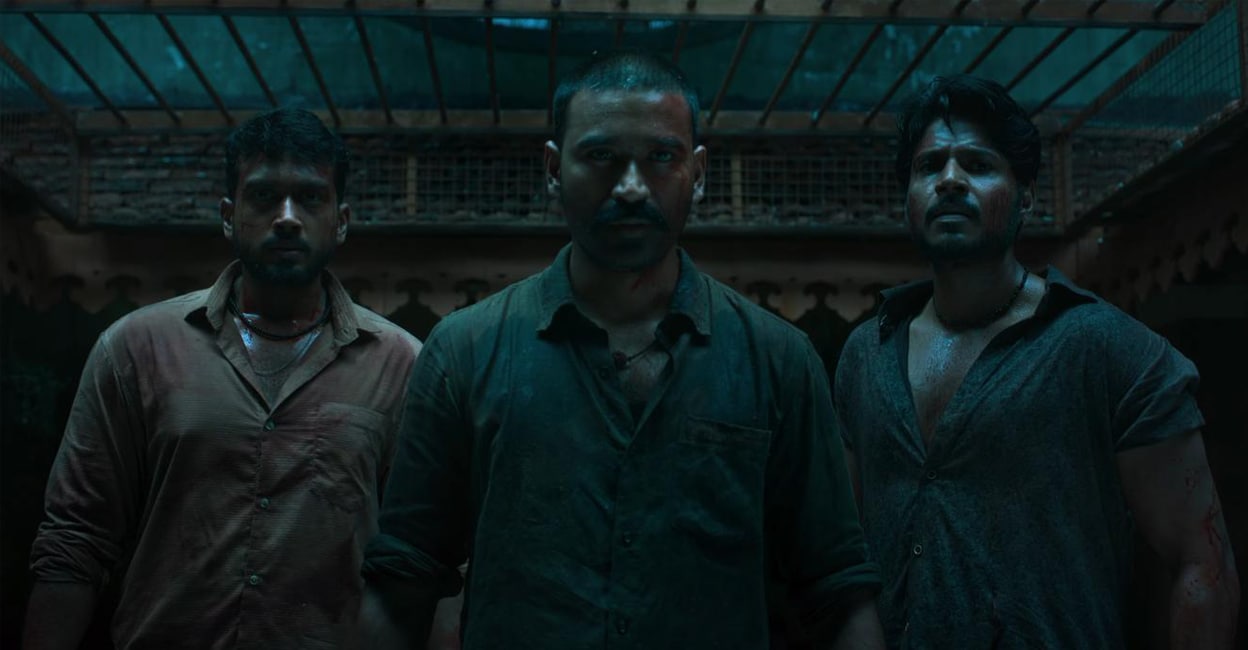'Raayan' review: Dhanush's stellar performance and A R Rahman's score shine amidst a thin storyline

This movie is definitely a must-see in theatres, with its effects and slow-motion scenes crafted perfectly for the big screen.
This movie is definitely a must-see in theatres, with its effects and slow-motion scenes crafted perfectly for the big screen.
This movie is definitely a must-see in theatres, with its effects and slow-motion scenes crafted perfectly for the big screen.
'Raayan', written and directed by Dhanush in his second directorial effort, is a film steeped in violence and centred around the theme of revenge. Set in slums of Chennai, drawing a parallel to a pack of wolves fiercely defending their territory when threatened. The film imagines a world where, like animals in the jungle, various gangs revelling in the city's underbelly, vie for dominance. But the focus is on the wolves' instinct to protect themselves. The story intensifies when internal conflicts brew, causing members of the pack to turn against each other.
The story centres on Raayan, played by Dhanush, a stoic figure who cares for his younger siblings Muthuvel (Sundeep Kishan), Manikkam (Kalidas Jayaram) and Durga (Dushara Vijayan). As unforeseen events disrupt their lives, chaos ensues, putting their familial bonds to the test.
The true standouts of the film are the cinematography and the pulsating background score by A R Rahman, which together form the backbone of the movie. While the storyline is fairly predictable, with most plot points easily anticipated, the movie is propelled by its visually striking scenes and Dhanush's brooding presence. These elements, along with a few unexpected twists, keep the audience engaged.

This movie is definitely a must-see in theatres, with its effects and slow-motion scenes crafted perfectly for the big screen. While the audience gets a brief glimpse of what young Raayan is capable of, director Dhanush gives the older Raayan an impressive build-up before the character unleashes the ultimate demolition acts. The build-up really pays off, eliciting applause from the audience during close-up shots and intense stunt sequences. There's a standout scene where Raayan and his brothers confront their enemies. Dhanush stands at the centre, with his brothers closely behind him. This moment perfectly captures the essence of a wolf pack, with Dhanush embodying the alpha wolf. The film's intense and gory stunt scenes are amplified by A R Rahman's score, which adds significant weight to each moment. The music serves as the movie's binding force-clever, thunderous, and powerful. This impact is especially evident when the song 'Adangaatha Asuran' plays.
The film's major drawback is its weak storyline. While Dhanush excels in his role, the development of supporting characters often feels lacking. This is particularly evident with the main antagonist, Sethu, played by S J Suryah, as well as to some extent with the characters played by Sundeep and Kalidas. Prakash Raj's role as a police officer doesn’t add much novelty to the plot. The story focuses heavily on Dhanush’s portrayal of a protective figure, akin to his role in 'Asuran'. However, 'Raayan' falls short of the impact and intensity of 'Asuran'. Both films feature Dhanush’s characters defending their families from feudal lords, but 'Raayan' struggles compared to 'Asuran', as the violence in 'Raayan' often feels misdirected. For instance, the abrupt change in Muthuvel and Manikkam is crucial to the plot but lacks explanation.
While the film shows intense violence, the motivations and execution of these scenes often lack clarity and logical coherence. Supporting actors such as Aparna Balamurali and Selvaraghavan deliver solid performances, and the film's symbolism is a notable strength. However, the climax is the most predictable element of the movie. Despite the visually striking red-hued setting, the foreseeable climax is a bit disappointing.
The movie is undeniably a power-packed experience, deserving a theatrical watch with its classic masala elements that keep the audience cheering for Dhanush until the very end.


